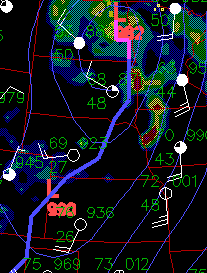Challenge
Questions
Crane
Home Page

Search Journey North
return to:

 A/CPB
A/CPB
Whooping Crane Migration Update: April 17, 1998
Today's Update Includes:
- They're On Their Way!
- Field Notes High Above Aransas
- Challenge Question # 7
- Field Notes And Migration Data From The Great Plains
- How To Respond To Today's Challenge Question
|
|
|
USFWS |
"The birds are almost all gone, with only 6 remaining!", exclaimed Tom Stehn just after finishing the latest aerial crane census flight at Aransas on April 16th.
Tom has bid farewell to over one hundred and thirty whooping cranes since the
last Crane Update, and he has provided his Field Notes and the Chart below so you
can determine when the cranes departed.
A little further north, Wally Jobman has been getting more sightings on the migrating
cranes, and he reports below that they have now reached the Dakotas and Saskatchewan!
Field Notes High Above Aransas
|
|
|
Migration Route |
From: Tom Stehn
Aransas National Wildlife Refuge
Austwell, Texas
April 16, 1998
Dear Students,
I just finished an aerial census of the Aransas NWR and surrounding areas, and the
birds are almost all gone! Only 6 cranes were remaining, including 2 adults, 3 subadults,
and 1 young = 6 whooping cranes. With only 6 cranes left, this indicates that an
estimated 28 more cranes have migrated since my last flight on April 9.
On today's flight there was only one family group (Rattlesnake Island). The juvenile
had only a little brown on the head and back and was extremely difficult to differentiate
from the adults. All other birds were believed to be subadults.
I also did an aerial census flight on April 9 and then I could only find 34 whooping
cranes. Using the chart below, can you answer this Challenge Question?
Challenge Question # 7
"How many additional whoopers left Aransas between April 2 and April 9?"
| Census Date |
#Cranes Counted |
#Cranes Departed |
| Peak |
182 |
0 |
| 03/26/98 |
154 |
28 |
| 04/02/98 |
139 |
15 |
| 04/09/98 |
34 |
|
| 04/16/98 |
06 |
28 |
(To respond to this question, please follow the instructions at the end of this report.)
The 34 cranes still present at Aransas on April 9 included two family groups (breeding
adult pairs with their juvenile from last summer) and 28 subadults (cranes that look
just like adults but are too young to breed, usually less than 3 years old). The
subadults aren't in a rush to migrate to Canada since they won't be building nests
or raising young. One of the last two families departed April 11. I fully expected
the other family to be gone when I climbed in the airplane on April 16 to check on
the cranes again.
Great Winds For Migrating...and Windsurfing!
One interesting departure of cranes occurred April 5 with the cranes taking full
advantage of clear skies and strong east tailwinds that day. I remember the winds
that I also used that day, since I went windsurfing in the Gulf of Mexico with a
steady 20 miles per hour of wind pushing me along. Tour Boat Captain Appell was leading
his morning whooping crane tour that day and observed 14 cranes leave between 0950
and 1030 AM. The cranes apparently waited until mid-morning for thermal currents
to develop before they left.
This satellite weather map shows that south winds blew along the Texas Coast on April
5th, after this high pressure system moved to the east.
 |
Also, here is a recap of the peak population for this winter at Aransas, which was:
152 + 30 = 182. With the loss of one adult crane, the flock is currently estimated at 181.
Now that almost all of the cranes have departed, hopefully the telephone will
be ringing as people call in to report seeing the whooping cranes as they speed north.
Until next time,
Tom Stehn
Whooping Crane Biologist
Aransas National Wildlife Refuge
Austwell, Texas
Field Notes From The Great Plains
April 17, 1998
Wally Jobman reports from Nebraska that the migrating cranes have now reached the Dakotas and Saskatchewan on strong south winds! The latest crane sightings are found at the end of this report. You can see these strong winds on the weather images below.
 |
 |
|
March 11, 1998 |
March 12, 1998 |
Wally plans to send out a further update next week!
How to Respond to Today's Challenge Question
1. Address an e-mail message to: jn-challenge-crane@learner.org
2. In the Subject Line of your message write: Challenge Question # 7
3. In the body of the message, answer this question:
Using the table above, "How many additional whoopers left Aransas between April 2 and April 9?"
The Next Whooping Crane Migration Update Will be Posted on April
23, 1998.
Copyright 1998 Journey North. All Rights Reserved.







